小学英语语法含有行为动词的一般过去时的一般疑问句
小学四种时态句子结构以及 各种时态标志词

小学四种时态句子结构以及各种时态标志词一般现在时的句型结构一般现在时的标志词:sometimes, often, usually, always, every day, five days a week, three times a month等.1. 含有be动词的句子结构的变化:①肯定句:主语+be(am,is,are)+其他。
如:I am a boy. 我是一个男孩。
②否定句:主语+ be + not +其他。
如:He is not a worker.他不是工人。
③一般疑问句:Be +主语+其它?如:-Are you a student? -Yes. I am. / No, I'm not.④特殊疑问句:疑问词+一般疑问句?如:Where is my bike?2. 含有行为动词的句子结构的变化:①肯定句:主语+行为动词(+其它)。
如:We study English.我们学习英语。
②否定句:主语+ don't( doesn't ) +动词原形(+其它)。
如:I don't like bread. He doesn't often play.③一般疑问句:Do( Does ) +主语+动词原形+其他? 如:-Do you often play football? - Yes, I do. / No, I don't. -Does she go to work by bike? - Yes, she does. / No, she doesn't.④特殊疑问句:疑问词+一般疑问句?即:疑问词+ Do( Does ) +主语+动词原形+其他? 如:How does your father go to work?一般过去时句型结构一般过去时标志词:yesterday, last, the daybefore …, ago和过去的某个时间,具体如下:(1)yesterday,yesterday morning/afternoon/evening ,last week, last year, at the end of last term/we 等,(2)一段时间+ago如:ten years ago, five hours ago,(3)过去的某个时间,如: on January 1st,2004, in the 1980s等.1.含有be动词的句子结构的变化:⑴am 和is在一般过去时中变为was。
外研社(三起)小学英语六年级下册一般过去时

Infinitive am / is are begin break bring build buy can
常见不规则动词
Past tense was were began broke brought built bought could
__D_i_d__ he __f_in_d_ ___a_n_y_ meat in the fridge?
3. She stayed there for a week.(对画线部分提问)
__H_o_w__ __lo_n_g__ __d_id__ she _s_t_ay__ there?Leabharlann That’s great!
1. Xiao Lin went fishing this morning.(改为一般疑问句) 2. We visited our teacher last night.(就画线部分提问) 3. He had lunch at school.(改为否定句) 4. There was some milk in the bottle. (就画线部分提问) 5. He went to that city with his uncle. (改为一般疑问句)
行为动词的一般过去式: a. 规则动词的变化规则: (1)一般动词直接加-ed (2)以e结尾的动词直接加-d (3)以辅音字母加y结尾的词,变y为i再加-ed (4)以重读闭音节结尾,词尾只有一个辅音字母,双写辅音字母加-ed
注:规则动词过去式的发音: 在清辅音后读/t/,在元音和浊辅音后读/d/,在辅音/t/,/d/后读 /id/。 b. 不规则动词变化需参看不规则动词表逐一熟记。
Exercise
按要求完成下列句子。
1. Lucy did her homework at home.(改为否定句)
(完整版)小学英语语法_四大时态

四大时态复习1. 一般现在时(1)一般现在时的构成(肯定句)☆be动词:主语+be(am,is,are)+其它。
如:I am a boy.我是一个男孩。
☆行为动词:主语+行为动词(+其它)。
如:We study English.我们学习英语。
☆当主语为第三人称单数(he, she,it)时,要在动词后加"-s"或"-es"。
如:Mary likes Chinese. 玛丽喜欢汉语。
(2)一般现在时的变化☆. be动词的变化。
[否定句]:主语+ be + not +其它。
如:He is not a worker.他不是工人。
[一般疑问句]:Be +主语+其它。
如:-Are you a student? -Yes. I am. / No, I'm not.[特殊疑问句]:疑问词+一般疑问句。
如:Where is my bike?☆.行为动词的变化。
[否定句]:主语+ don't( doesn't ) +动词原形(+其它)。
如:I don't like bread.当主语为第三人称单数时,要用doesn't构成否定句。
如:He doesn't often play.[一般疑问句]:Do( Does ) +主语+动词原形+其它。
如:- Do you often play football?- Yes, I do. / No, I don't.当主语为第三人称单数时,要用does构成一般疑问句。
如:- Does she go to work by bike? - Yes, she does. / No, she doesn't.[特殊疑问句]:疑问词+一般疑问句。
如:How does your father go to work?*动词+s的变化规则1.一般情况下,直接加-s,如:cook-cooks, milk-milks2.以s. x. sh. ch. o结尾,加-es,如:guess-guesses, wash-washes, watch-watches, go-goes 3.以“辅音字母+y”结尾,变y为i, 再加-es,如:study-studies2.现在进行时(1)一般现在时的构成:be(am,is, are)+ 动词的ing形式。
一般过去时的基本结构
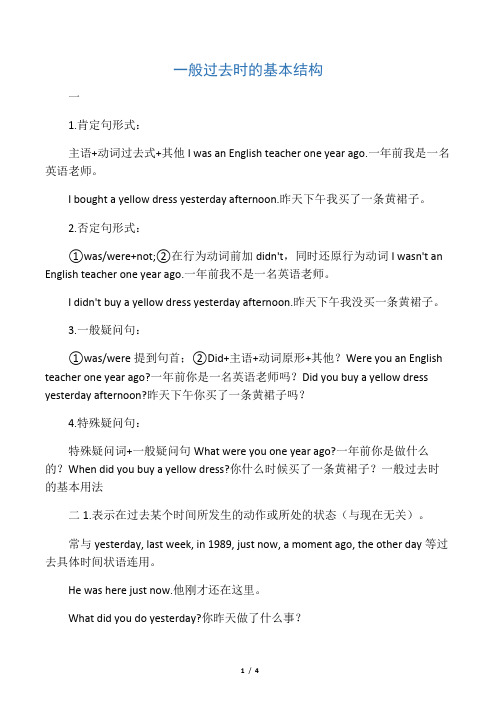
一般过去时的基本结构一1.肯定句形式:主语+动词过去式+其他I was an English teacher one year ago.一年前我是一名英语老师。
I bought a yellow dress yesterday afternoon.昨天下午我买了一条黄裙子。
2.否定句形式:①was/were+not;②在行为动词前加didn't,同时还原行为动词I wasn't an English teacher one year ago.一年前我不是一名英语老师。
I didn't buy a yellow dress yesterday afternoon.昨天下午我没买一条黄裙子。
3.一般疑问句:①was/were提到句首;②Did+主语+动词原形+其他?Were you an English teacher one year ago?一年前你是一名英语老师吗?Did you buy a yellow dress yesterday afternoon?昨天下午你买了一条黄裙子吗?4.特殊疑问句:特殊疑问词+一般疑问句What were you one year ago?一年前你是做什么的?When did you buy a yellow dress?你什么时候买了一条黄裙子?一般过去时的基本用法二1.表示在过去某个时间所发生的动作或所处的状态(与现在无关)。
常与yesterday, last week, in 1989, just now, a moment ago, the other day等过去具体时间状语连用。
He was here just now.他刚才还在这里。
What did you do yesterday?你昨天做了什么事?2.在过去一段时间内的经常性或习惯性动作。
We often played together when we were children.我们小时候常在一起玩。
【单元热点难点】译林版(三起)英语六年级上册Unit 3 Holiday fun 语法重点(含解析)
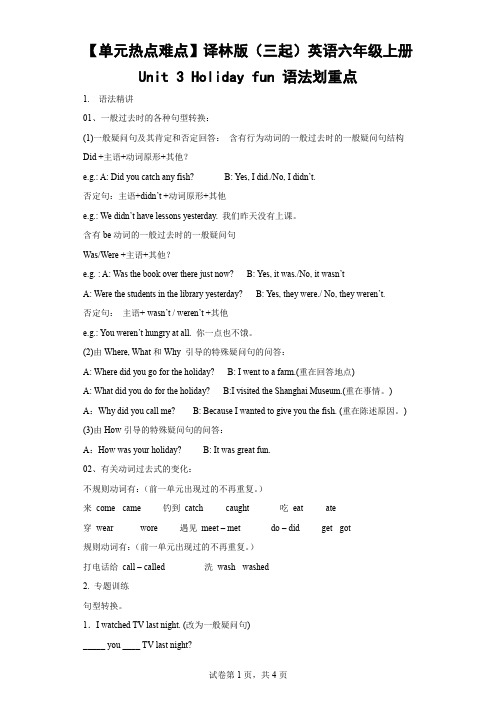
【单元热点难点】译林版(三起)英语六年级上册Unit 3 Holiday fun 语法划重点1. 语法精讲01、一般过去时的各种句型转换:(1)一般疑问句及其肯定和否定回答:含有行为动词的一般过去时的一般疑问句结构Did +主语+动词原形+其他?e.g.: A: Did you catch any fish? B: Yes, I did./No, I didn’t.否定句:主语+didn’t +动词原形+其他e.g.: We didn’t have lessons yesterday. 我们昨天没有上课。
含有be动词的一般过去时的一般疑问句Was/Were +主语+其他?e.g. : A: Was the book over there just now? B: Yes, it was./No, it wasn’tA: Were the students in the library yesterday? B: Yes, they were./ No, they weren’t.否定句:主语+ wasn’t / weren’t +其他e.g.: You weren’t hungry at all. 你一点也不饿。
(2)由Where, What和Why 引导的特殊疑问句的问答:A: Where did you go for the holiday? B: I went to a farm.(重在回答地点)A: What did you do for the holiday? B:I visited the Shanghai Museum.(重在事情。
)A:Why did you call me? B: Because I wanted to give you the fish. (重在陈述原因。
)(3)由How引导的特殊疑问句的问答:A:How was your holiday? B: It was great fun.02、有关动词过去式的变化:不规则动词有:(前一单元出现过的不再重复。
小学生必须掌握的重点英语语法“四大时态”
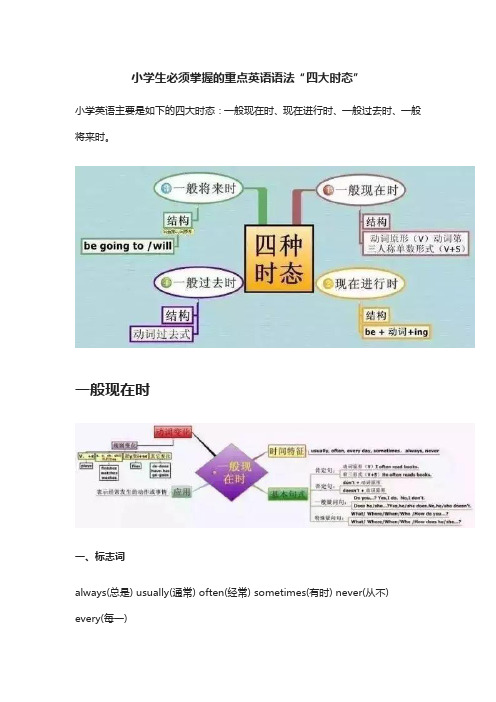
小学生必须掌握的重点英语语法“四大时态”小学英语主要是如下的四大时态:一般现在时、现在进行时、一般过去时、一般将来时。
一般现在时一、标志词always(总是) usually(通常) often(经常) sometimes(有时) never(从不) every(每一)二、基本用法1.表示事物或人物的特征、状态。
2.表示经常性、习惯性的动作。
3.表示客观现实。
三、构成1.be动词:主语+be动词(am isare)+其它.2.行为动词:主语+行为动词+其它。
四、句型肯定句:A. be 动词:be+主语+其它。
B. 行为动词:主语+动词(注意人称变化)+其它。
否定句:A.be动词:主语+be+not+其它。
B.行为动词:主语+助动词(do/does)+not+d动词原形+其它一般疑问句:A.be动词:be+主语+其它。
B.行为动词:助动词(Do/Does)+主语+动词原形+其他.特殊疑问词:疑问词+一般疑问句现在进行时一、标志词now(现在), look(看),listen(听)二、基本用法表示现阶段正在进行的动作三、基本结构1.肯定句:主语+be动词+动词现在分词(ing)+其它。
2.否定句:主语+be动词+not+动词现在分词(ing)+其它。
3.一般疑问句:be动词+主语+现在分词(ing)+其它。
4.特殊疑问句:疑问词+一般疑问句。
一般将来时一、标志词tomorrow(明天),soon(不久),will(将要=be going to)二、基本用法表示在在将来某个时间要发生的动作或存在的状态。
三、基本结构1.肯定句:主语+ be going to + 动词原形。
主语+will+动词原形。
2.否定句:主语+ be going to +动词原形。
主语+won’t + 动词原形3.一般疑问句:Be + 主语+ going to+动词原形Will + 主语+ 动词原形4.特殊疑问句:疑问词+一般疑问句一般过去时一、标志词yesterday(昨天),ago(以前),before(在...之前)二、用法1.表示过去某个时间发生的动作或存在的状态,常和表示过去的时间状语连用。
小学英语语法一般过去时总结及练习
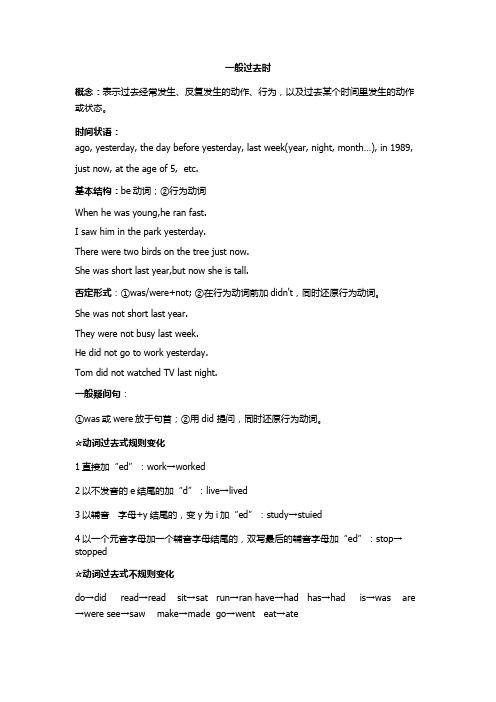
一般过去时概念:表示过去经常发生、反复发生的动作、行为,以及过去某个时间里发生的动作或状态。
时间状语:ago, yesterday, the day before yesterday, last week(year, night, month…), in 1989, just now, at the age of 5, etc.基本结构:be动词;②行为动词When he was young,he ran fast.I saw him in the park yesterday.There were two birds on the tree just now.She was short last year,but now she is tall.否定形式:①was/were+not; ②在行为动词前加didn't,同时还原行为动词。
She was not short last year.They were not busy last week.He did not go to work yesterday.Tom did not watched TV last night.一般疑问句:①was或were放于句首;②用did 提问,同时还原行为动词。
☆动词过去式规则变化1直接加“ed”:work→worked2以不发音的e结尾的加“d”:live→lived3以辅音字母+y结尾的,变y为i加“ed”:study→stuied4以一个元音字母加一个辅音字母结尾的,双写最后的辅音字母加“ed”:stop→stopped☆动词过去式不规则变化do→did read→read sit→sat run→ran have→had has→had is→was are →were see→saw make→made go→went eat→ate一般过去时的练习一、用所给的动词的适当形式填空。
⒈He ___________(visit) the Great Wall last year.2.We____________(have) a good time yesterday.3.We often __________(go) to school by bus last year.4.I __________(live)in the village when I was a child.5.Mike__________(see) a big tiger in the nature park last year.6.Sam___________ (do) the housework yesterday.7.________(do) you _________(enjoy) yourself yesterday?8.________(do)you __________(play) the violin in the artroom yesterday?9.I __________ (eat) a big pizza yesterday.10.There_________ (be) many sheep on the farm last year.11. I _________ (watch) a cartoon on Saturday.12. Her father __________ (read) a newspaper last night.13. We _________ to zoo yesterday, we ___________ to the park. (go)14. _________ you __________ (visit) your relatives last Spring Festival?15. _________ he __________ (fly) a kite on Sunday? Yes, he __________.二、单项选择( ) 1. She watered the flowers ________.A tomorrowB sometimesC yesterday morning( ) 2.What ____ Mike do last weekend ?A doB doesC did( ) 3. I ___ my room last Sunday.A cleanedB cleanC am cleaning( ) 4. _____ you _____ TV last night .A Do, watchB Did, watchC Did, watched( ) 5.---Did your father write an e-mail yesterday ?A Yes, he did.B Yes, he doesC No, he don’t( ) 6.They _____ on a trip in February ,2007.A are goingB goingC went( ) 7. ____ he ____ football two days ago?A Does , playB Did , playedC Did , play三、Be动词的过去时练习(一)用be动词的适当形式填空。
一般过去时详解(重点)
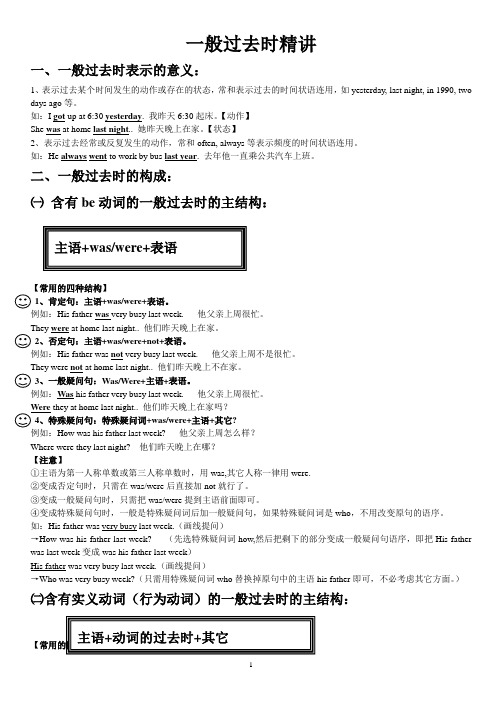
一般过去时精讲一、一般过去时表示的意义:1、表示过去某个时间发生的动作或存在的状态,常和表示过去的时间状语连用,如yesterday, last night, in 1990, two days ago 等。
如:I got up at 6:30 yesterday . 我昨天6:30起床。
【动作】She was at home last night .. 她昨天晚上在家。
【状态】2、表示过去经常或反复发生的动作,常和often, always 等表示频度的时间状语连用。
如:He always went to work by bus last year . 去年他一直乘公共汽车上班。
二、一般过去时的构成:㈠ 含有be 动词的一般过去时的主结构:【常用的四种结构】1、肯定句:主语+was/were+表语。
例如:His father was very busy last week. 他父亲上周很忙。
They were at home last night.. 他们昨天晚上在家。
2、否定句:主语+was/were+not+表语。
例如:His father wasnot very busy last week. 他父亲上周不是很忙。
They were not at home last night.. 他们昨天晚上不在家。
3、一般疑问句:Was/Were+主语+表语。
例如:Was his father very busy last week. 他父亲上周很忙。
他们昨天晚上在家吗?+was/were+主语+其它?例如:How was his father last week? 他父亲上周怎么样?Where were they last night? 他们昨天晚上在哪?【注意】①主语为第一人称单数或第三人称单数时,用was,其它人称一律用were.②变成否定句时,只需在was/were 后直接加not 就行了。
- 1、下载文档前请自行甄别文档内容的完整性,平台不提供额外的编辑、内容补充、找答案等附加服务。
- 2、"仅部分预览"的文档,不可在线预览部分如存在完整性等问题,可反馈申请退款(可完整预览的文档不适用该条件!)。
- 3、如文档侵犯您的权益,请联系客服反馈,我们会尽快为您处理(人工客服工作时间:9:00-18:30)。
含有行为动词的一般过去时的一般疑问句及练习
一、含有行为动词的一般过去时,改为一般疑问句的方法在句首加did,句子中的动词过去式变回原形。
即: Did+主语+动词原形…?肯定回答: Yes,主语+did.否定回答: No,主语+didn’t.
二、例题解析
Jim went home yesterday.(改为一般疑问句,并作肯定和否定回答)解题思路:
(1)找出动词went,属于过去式,借助于助动词did;
(2)将助动词did移前,went 用原形go;
一般疑问句:Did Jim go home yesterday?
吉姆昨天回家了吗?
肯定回答: Yes,he did.
否定回答:No,he didn’t.
小试牛刀
1. Mike made some cards for his teachers. (改为一般疑问句,并作肯定回答) ______Mike_______any cards for his tcachers?
2.We played football with our classmates last week. (改为一般疑问句,并作否定回答)
_____you_____ football with________ classmates last week?
3.Mr Green cooked a lot of food on Wednesday.(改为一般疑问句,并作肯定回答)
______Mr. Green_______a lot of food on Wednesday?
4. I was in the teachers’office just now.(改为一般疑问句,并作否定回答) _____________in the teachers’office just now?
5.It rained all day on Children’s Day.(改为一般疑问句,并作否定回答)
__________all day on Children's Day?
6. They watched cartoons last Sunday.(改为一般疑问句,并作否定回答)
____________________________last Sunday?
7.I brought some drinks, honey andjiaozi. (改为一般疑问句,并作肯定回答) _____________drinks,honey_________jiaozi?
8.Mr. Green lived in a small town.(改为一般疑问句,并作否定回答)
______________Mr. Greeen_______a small town?
含有行为动词的一般过去时的一般疑问句及其练习参考答
案
1.Did,make,Yes,he,did
2.Did,play,your,No, we,
didn't3.Did,cook,Yes,he,did 4.Were you,No,l
wasn't5.Did,it,rainNo,itdidn't6.Did,they,watch.
cartoons,No,they,didn't 7.Did,you,bring,any,or
Yes,I,did 8.Did,live,in,No,he,didn't。
